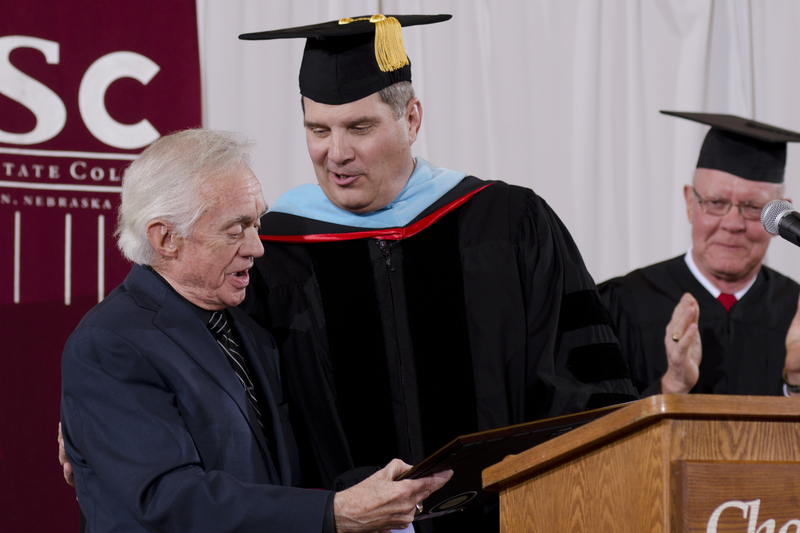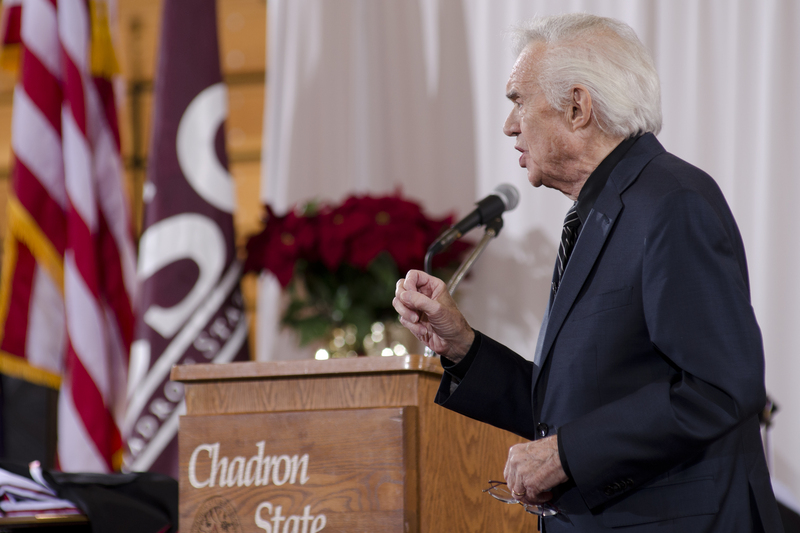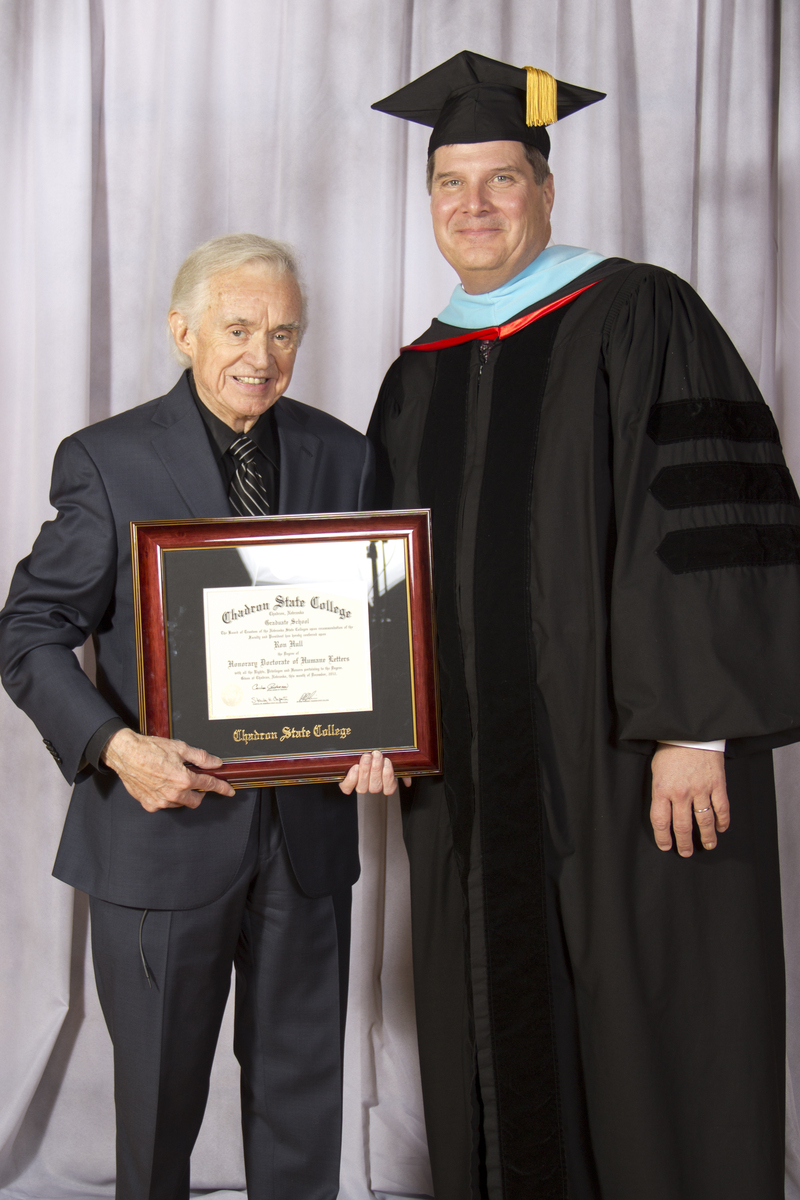Television pioneer relays scenes of inspiration

Nebraska public television pioneer Dr. Ron Hull of Lincoln relayed the advice that he’s gleaned from several notable Nebraskans as he served as commencement speaker for those receiving bachelor degrees at Chadron State College on Friday, Dec. 14.
Hull, who has been involved with the Mari Sandoz Heritage Society since its inception and was instrumental in the development of the Mari Sandoz High Plains Heritage Center on the CSC campus, spoke immediately following his acceptance of the CSC Honorary Doctor of Humane Letters degree. He was chosen for the honor for his outstanding service to CSC and greater society.
Hull was the ETV program manager from 1955-1982 and continues to serve as senior adviser to Nebraska Educational Telecommunications and professor emeritus of Broadcasting for the University of Nebraska at Lincoln.
“I’ve discovered that the most important aspect of our lives is the relationships that we have with each other,” he said during the 21-minute speech to the 114 graduates. “Nothing passes that. When I was in college, I remember some cynics would say, ‘Ah, you won’t get ahead. It depends on who you know.’ It’s true. It depends on who you know, but you make those connections yourself.”
Hull recalled stories of both Mari, the acclaimed author from northwest Nebraska, and her sister, Flora. He had developed a relationship with the family after producing 18 hours of television interviews with Mari.
Hull recounted advice from Flora, who joined Hull in speaking to CSC graduates in May 1975. She received the CSC Distinguished Award that year and Hull served as the commencement speaker. Hull described Flora as a “no nonsense person,” and said her presentation to the graduates was one of the best speeches he’s ever heard.
“She looked those graduates right straight in the face and said ‘Hitch your wagon to your star. Get in harness and pull your own load. There is lots of work to be done. Thank you.’”
Hull also encouraged graduates to emulate the work ethic of Mari. He described Mari as a “High Plains person” and said she worked harder than almost anyone else from he’s met during his profession.
He recalled Mari telling him that her most satisfying book was “Crazy Horse: The Strange Man of the Oglalas.” She told him that her first version of the book contained a great story, but was told from a “white man” perspective and lacked effectiveness. She proceeded to rewrite the entire book to give it an Indian voice.
“She gave 100 percent of herself, her energy and her talents to tell the stories to tell the people of the High Plains country,” he said. “The traits Mari Sandoz had are your traits, too – hard work, give it your best shot. We’re western people. I’m from Rapid City. You’ve got it already because you’re High Plains people.”
Hull also spoke about John Neihardt, the Nebraska poet laureate who died in 1973. A lot of guidance can be taken in Neihardt’s book, “Black Elk Speaks,” Hull said, noting that it has a wealth of information about “how to live our lives.”
Hull relayed a story Neihardt told him about his exchange with a troubled student during the author’s teaching days at the University of Missouri. It was the era of the Vietnam Conflict and Hull said the student was distressed by the state of the world.
“Neihardt said, ‘You know you’re right. We could take 24 hours and talk about how terrible things are in this country -- in our lives. Everywhere you look you will find something that is not good.’ But, he said, ‘If we’re going to do that, let’s take 24 hours and let’s talk about the things around you that are good and wonderful,’” Hull said.
Following that advice, Hull encouraged the students to find their happiness.
“You choose the life you want to have. If you have the life you want, believe me, that’s the first step to happiness.”
Hull also told of his experiences during the Vietnam era. In 1966 he signed on to help establish a television network in Vietnam to assist in President Lyndon Johnson’s efforts to “win the hearts and minds of the country.” Hull gave credit to his wife for supporting his involvement, even though it meant she would have to care for their four small children without his help until he returned.
He noted that many Vietnamese families had fled the war-torn countryside to live in the comparatively safe cities. It was common to see families living under culverts, in boxes and under eves, he said.
Although advised not to give the native Vietnamese money, he said he became compelled to give $20 to the mother of four children who was living on the streets. Later, while walking the street, he noticed that she had used the money to have her hair done. Around her, he said, were her children with pride in their eyes.
“Those smiles told me that was the best investment of 20 bucks I had ever made in my whole life,” he said.
He encouraged the graduates to use their educations to “get out in the world and do things for other people.”
“I promise that it comes back to you 12-fold all the time,” he said. “That’s how the world works.”
Hull told about broadcasting a television show to the Vietnamese from a large aircraft equipped with an antenna. The “flying studio” was the source of two-hour broadcasts 10,000 feet above Saigon, a temporary solution as the television network was being constructed below.
Hull said he hopes that the Vietnamese were inspired by the broadcasts of history and arts, much like the college graduates have been inspired by the faculty who have helped them along the way.
“I kept thinking, can we inspire some of those little kids to maybe dream and have their own dream?” he said. “You never know. You do your best. You don’t know where you’ll plant a seed.”
Category: Campus News, Commencement


